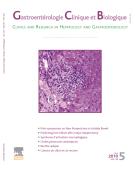Transient elastography (FibroScan) - 28/10/08
 , J. Vergniol
, J. VergniolSummary |
Transient elastography (FibroScan) is a non-invasive method proposed for the assessment of hepatic fibrosis in patients with chronic liver disease by measuring liver stiffness. It can be easily performed at the bedside or in the outpatients clinic with immediate results and good reproducibility. Limitations include failure (no value) in around 5% of cases, mainly in patients with substantial thoracic fat. In France, FibroScan or FibroTest are recommended for the initial evaluation of liver fibrosis in previously untreated patients with chronic hepatitis C and no concomitant health disorders. FibroScan is validated for the diagnosis of significant fibrosis and cirrhosis in chronic hepatitis C, recurrence of hepatitis C after liver transplantation, co-infections in HIV-HCV patients and chronic cholestatic diseases, but needs further evaluation in other chronic liver diseases. FibroScan is an excellent tool for early detection of cirrhosis and evaluation of portal hypertension, for which it may have prognostic value as well. Studies are needed using FibroScan for the follow-up of patients with and without treatment, and for the screening of patients at risk of liver disease. However, although FibroScan is a good method for the evaluation of fibrosis in patients with chronic liver disease, it has to be borne in mind that FibroScan evaluates liver stiffness. Therefore, FibroScan values have to be interpreted according to clinical, biological and morphological data.
Il testo completo di questo articolo è disponibile in PDF.Résumé |
L’élastographie impulsionnelle (FibroScan) est une méthode non-invasive de diagnostic de la fibrose hépatique chez les patients pris en charge pour maladie hépatique chronique en mesurant l’élasticité hépatique. C’est une technique facilement réalisable en consultation, avec un résultat immédiat et une bonne reproductibilité. Ses limites sont l’échec (absence de valeur) dans environ 5% des cas, principalement chez les malades avec une surcharge en graisse thoracique. En France, le FibroScan ou le FibroTest sont recommandés pour l’évaluation initiale de la fibrose hépatique au cours de l’hépatite C sans co-morbidité. Le FibroScan est validé pour le diagnostic de la fibrose significative et de la cirrhose au cours de l’hépatite C, de la co-infection VHC-VIH, de la récidive virale C après transplantations hépatique, de l’hépatite B et nécessite d’autres études dans les autres indications. Le FibroScan est un excellent moyen de diagnostic de la cirrhose débutante, de l’hypertension portale, et pourrait avoir un intérêt pronostique. D’autres études sont nécessaires pour évaluer l’intérêt du FibroScan dans le suivi des malades avec ou sans traitement ou le dépistage des sujets à risque. Même si le FibroScan est une bonne méthode de diagnostic de la fibrose hépatique, il ne faut pas oublier que le FibroScan évalue directement l’élasticité hépatique. De ce fait, le résultat de FibroScan doit être interprété en fonction du contexte clinique, biologique et morphologique.
Il testo completo di questo articolo è disponibile in PDF.Keywords : Transient elastography, FibroScan, Liver fibrosis, Cirrhosis
Mots clés : Fibrose, Cirrhose, FibroScan, Elastographie impulsionnelle
Mappa
Vol 32 - N° 6S1
P. 58-67 - Settembre 2008 Ritorno al numeroBenvenuto su EM|consulte, il riferimento dei professionisti della salute.

